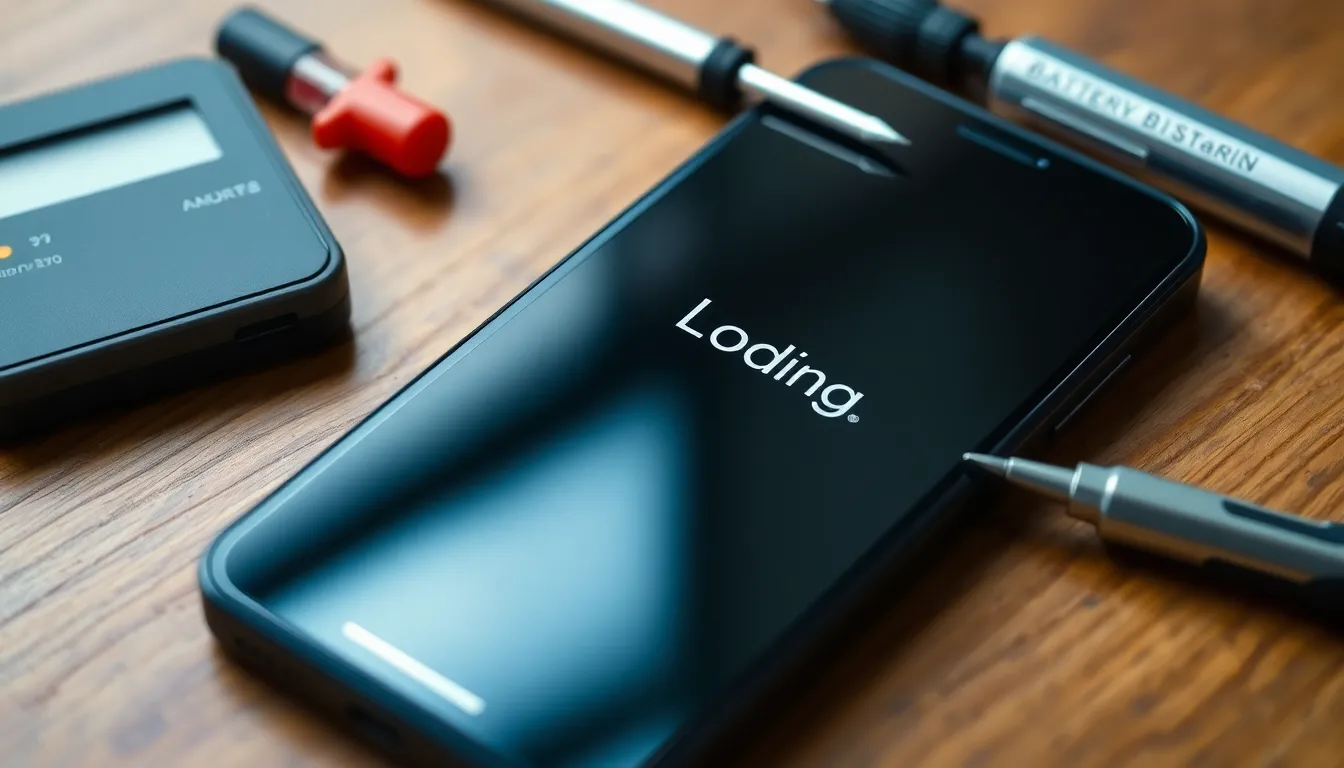Table of Contents
TogglePicture this: you’re deep in a heated text conversation or finally binge-watching that show everyone’s raving about, and suddenly—bam! Your iPhone decides it’s time for a nap and restarts. Frustrating, right? It’s like your phone has a mind of its own, throwing a surprise party when you least expect it.
Understanding iPhone Random Restarts
iPhones restart unexpectedly for multiple reasons. Software glitches often trigger these incidents. Outdated software contributes to instability. Staying current with updates reduces the chances of these random restarts.
Hardware issues can also play a significant role. Faulty batteries may lead to sudden shutdowns. A battery aging beyond its capacity often affects performance. Users should check battery health in settings for signs of degradation.
Apps misbehaving sometimes cause restarts. Some applications conflict with the operating system, leading to crashes. Deleting problematic apps may stabilize the device.
Overheating presents another common cause. High temperatures can force an iPhone to restart as a protective measure. Keeping the device cool helps maintain optimal performance.
Excessive storage use might also be a factor. Low storage space strains the system, causing irregular behavior. Regularly clearing unused files or apps can enhance overall functionality.
Environmental conditions impact device performance as well. Extreme cold or heat can trigger malfunctions. Avoiding exposure to harsh environments prolongs device life.
Diagnosing the primary cause requires attention to detail. Observing patterns in restarts can reveal underlying issues. Resetting the iPhone or restoring it to factory settings often resolves persistent problems.
Being proactive with device maintenance minimizes interruptions during daily activities. Regular check-ups can eliminate many common causes of random restarts.
Common Causes of Random Restarts

Random restarts on an iPhone can stem from various sources. Understanding these causes can help identify and resolve the issue effectively.
Software Glitches
Software glitches often trigger unexpected restarts. An outdated OS can lead to compatibility issues, resulting in system instability. Furthermore, corrupted app data may cause apps to crash, subsequently affecting the entire device. Application conflicts can also arise, especially with third-party apps. Regular updates fix these glitches, so keeping the software current is crucial. Monitoring for any unusual app behavior can help detect these issues early.
Hardware Issues
Hardware issues contribute significantly to random restarts. Aging components, such as damaged circuits, can result in unexpected shutdowns. Over time, wear can affect connections within the device. Additionally, manufacturing defects may lead to inherent problems in specific models. Physical damage, such as a drop or water exposure, also negatively impacts hardware functionality. Users should consider inspecting their devices for any visible signs of wear to identify potential hardware failures.
Battery Problems
Battery problems frequently cause intermittent restarts. Degraded battery health may lead to insufficient power, prompting the device to shut down abruptly. Sudden fluctuations in battery charge can confuse the hardware and lead to random restarts. In some cases, a faulty battery results in erratic performance, particularly in older devices. Regularly checking battery health through settings allows users to monitor any declines in performance. If battery health falls below a certain threshold, replacing the battery can restore functionality.
Troubleshooting Steps for Users
Following specific troubleshooting steps can help identify and resolve the issue of random iPhone restarts.
Restarting the Device
A simple restart often resolves minor software glitches. Users can press and hold the side button along with the volume button to power off. Holding the button until the slide to power off option appears will initiate the restart process. Once powered down, waiting a few seconds before turning it back on can often refresh the system, eliminating temporary software bugs. Experimenting with a forced restart may also be beneficial. For this method, quickly press and release the volume up button, quickly press and release the volume down button, then press and hold the side button until the Apple logo appears.
Updating iOS
Keeping the iPhone updated plays a crucial role in maintaining optimal performance. Users should navigate to Settings, select General, and then tap Software Update to see if a new version is available. Installing the latest iOS version often fixes known bugs that may cause the device to restart unexpectedly. Ignoring updates may expose the device to stability issues linked to outdated software. Setting automatic updates can ensure the iPhone remains current without manual intervention.
Checking Battery Health
Battery health significantly impacts overall device performance. Users can check battery status by going to Settings, selecting Battery, and tapping Battery Health. A healthy battery shows maximum capacity and peak performance capability. If battery health drops below 80%, considering a battery replacement becomes essential. Degraded batteries lead to unexpected shutdowns and create instability in performance. Regularly monitoring battery health can prevent issues associated with random restarts and enhance the user’s experience.
When to Seek Professional Help
Certain scenarios signal the need for professional assistance regarding iPhone random restarts. Frequent or persistent restarts can indicate underlying hardware issues that require expert diagnosis. Malfunctioning components like a battery or logic board may be at fault, especially if the device fails to start consistently.
In addition, extreme overheating should prompt users to seek help immediately. Prolonged high temperatures can damage internal parts, leading to severe performance problems. If an iPhone shuts down repeatedly, even after troubleshooting steps, this could indicate a deeper issue that a professional can assess.
Another important factor is age. Older iPhone models naturally experience a decline in performance due to worn components. If a device is several years old and exhibits constant shutdowns, considering a professional evaluation may be wise.
Investigating app behavior offers insight into potential problems as well. If specific apps trigger restarts regularly, a technician may identify conflicting software or compatibility issues that need resolution. Occasionally, faulty updates can also lead to instability, which professionals can address effectively.
Lastly, vague error messages or alerts accompanying restarts often hint at serious software problems. When the user encounters unexplained behavior repeatedly, seeking professional help ensures timely intervention before further complications arise.
Prioritize consultation with an authorized service provider when observing the above patterns. Reduced functionality and increased downtime can disrupt daily tasks significantly. Addressing concerns promptly with expert guidance can restore a device’s reliability and overall user satisfaction.
Random iPhone restarts can be a significant annoyance disrupting daily activities. Understanding the potential causes is essential for effective troubleshooting. Users should prioritize regular maintenance and software updates to prevent issues. Monitoring battery health and being aware of app behaviors can also contribute to a smoother experience.
When restarts become frequent or persistent it may be time to seek professional help. Addressing underlying hardware or software problems promptly can restore device reliability. By staying proactive with care and maintenance users can minimize interruptions and enjoy their iPhone to the fullest.




